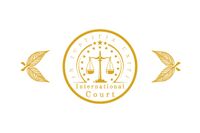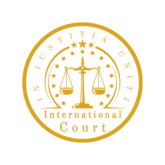The International Court
This article is incomplete because it is pending further input from participants, or it is a work-in-progress by one author. Please comment on this article's talk page to share your input, comments and questions. Note: To contribute to this article, you may need to seek help from the author(s) of this page. |
International Court | |
|---|---|
| Type | judicial union |
| Leaders | |
| Establishment | |
• Charter of the International Court | 4 January 2015 |
Website ic.int | |
The International Court, sometimes known as the World Court, the International Court of Anteria, the Supreme Court of the World, is an international governmental organization that settles disputes between its member states in accordance with international law and gives advisory opinions on other various areas of international law. The court's decisions are only binding to its member states, however it is on its member states to collectively work together to enforce the courts decisions. The court will occasionally hear disputes on non-member states, however these decisions are only advisory and non-binding. The court will also take no action to ensure enforcement of advisory opinions. Currently, the IC is the only international court that adjudicates general disputes between countries, with its rulings and opinions serving as primary sources of international common law.
The IC was established on January 4th, 2015. The Charter of the IC sets forth its purposes, rules, statues, format, and procedure. The IC is a bench of 7 judges elected by delegates for twenty-year terms. The International Court is headquartered in TBD, TBD
History
The idea of an international institution established for the purpose of settling international disputes was proposed by TBD to the Pact of the Republics in 2008, however logistical reasons and the various limitations imposed by the Pact of the Republics's charter prevented the idea from evolving and it faded from discussion. Renewed efforts came later when Dantes brought up the idea to Sebric Federal Minister of Justice Zakāria Insbruk and Kentalian Minister of Justice Antoniya Vlasova. The three worked with committees within their governments and drafted the Charter of the International Court in late 2014. After it was ratified by the Kentalian and Sebric governments, the IC was established on January 4th 2015. Anterpol and the International Bar Association were all constituted shortly thereafter on January 15th. After various talks with the Bakyern government, on February 9th, 2020, The IC created International Pre-Trail and Post-Trail Services, which was created to delegate certain services of the court. IPTPTS shortly contracted United Correctional Facility Corporation to build the International Prison Complex, construction of which was completed in early 2021. The ICP is owned by the United Correctional Facility Corporation but will comply with IPTPTS policy.
Selected Cases
| Name: | Case: | Date of Trail: | Charge: | Ruling/Sentence: | Notes |
| Lev Smirnov of |
International Community v. Smirnov | 7 August 2020 | Terrorism (Domestic) | Smirnov had committed a terrorist act in Kentalis which resulted in the death of 48 citizens. After his arrest, he was tried in the IC under the Terrorism Clause. The Court ruled that Smirnov was guilty of Domestic Terrorism, reasoning that the overwhelming evidence was indisputable. The Court sentenced Smirnov to life in prison. He is current serving his Life-Sentence in Kentalis. | Smirnov was the case that solidified the Court's power to hear domestic terrorism cases. As during trial Smirnov objected to the court's jurisdiction arguing that his actions were an internal Kentalis mater. The court held in the majority that defended its jurisdiction, holding that "parties to the charter intended all terrorism to be subject to this court's review" because "terrorism is such a grave act that concerns the international community as a whole, regardless of how localized it may be." Justice Weidmann dissented from the opinion arguing that domestic terrorism was a internal issue to each nation. |
Organization
The International Court is made up of four separate entities which include the court itself, Anterpol, International Pre-Trial and Post-Trail Services, and the International Bar Association. The IC requires that all member state contribute of 3.24 million ACU to the IC Budget which covers all its operating expenses for all its agencies. The Total budget comes out to 61.56 million ACU
| Agency | Headquarters | Purpose | Leader |
|---|---|---|---|
| International Court (IC) | TBD, TBD | Settle disputes between its member states and decide trials of international crimes in accordance with international law and give advisory opinions on other various areas of international law. | Chief Justice TBD, TBd |
| The International Criminal Police Organization (ANTERPOL) | Aresov, |
Facilitates police cooperation, investigations, and crime control between member states with regards to international crimes and international law. It also has specialized agents that have the power to arrest with relation to international crimes and law. | Director Zarya Mikelaski of Kentalis |
| International Pre-Trial and Post-Trail Services (IPTPTS) | Wicht, |
Administers probation, bail, supervised release, collections, pre-trial confinement, as well as prepares cases and publications, and ensures compliance of decisions in the context of international law for the International Court. It also provides policies for the International Prison Complex (IPC) which is owned and administered by United Correctional Facility Corporation. The IPC housed international criminals and is near Hasfelden in western |
Director Oskar Muller of Bakyern |
| International Bar Association (IBA) | TBD, TBD | To qualify lawyers and judges for service in international law. | Chairman TBD, TBD |
Composition
The IC is composed of seven judges elected to twenty-year terms. The judges were nominated by IC member states and then voted on by the member state's Ambassador to the IC. The Chief Justice is chosen as being the most senior member of the court and is currently TBD, being the first judge on the bench and serving since 2015. Judges of the IC are entitled to the style of Their Honor. No two judges currently serving may be nationals of the same country nor can any judge be elected more than once. The working language of the court is english.
To be a eligible judge on the bench of the IC the judge needs to have served as judge in a member state, be among persons of high moral character, not hold any other political office at the time of their assent to the bench, be able to hold impartiality, have no conflicts of interest, understand and apply international law, be of at least 30 years of age, and cannot be convicted of any felony or high crime in a member state.
Judges may deliver joint judgments or give their own separate opinions. Decisions and advisory opinions are by majority. Judges may also deliver separate dissenting opinions.
The Current Seven Justices of the Court
| Justice | Nation | Term |
|---|---|---|
| Tomas Jimæs Fijerbargen | 2015-2035 | |
| Yorik J. Nikafsha | 2016-2036 | |
| Friedrich A. Weidmann | 2020-2040 | |
| Lucía de la Armenta | 2020-2040 | |
| Anton K. Dmytruk | 2020-2040 | |
| Hanol Tashi | Template:Country data Sanjion | 2015-2035 |
Jurisdiction
The International Court and its various agencies have full jurisdiction in all its member states, and limited "invited" jurisdiction elsewhere.
Members
| Nation | Year Joined |
|---|---|
| 2015 | |
| 2015 | |
| 2015 | |
| 2016 | |
| 2017 | |
| 2018 | |
| File:Halsunt Flag.png Halsuntria | 2019 |
| 2020 | |
| 2020 | |
| 2020 | |
| 2020 | |
| 2020 | |
| 2020 | |
| 2020 | |
| 2020 | |
| 2020 | |
| 2020 | |
| 2020 | |
| 2020 | |
| 2021 |
Observer States
| Nation |
|---|
International Crimes
To hear a case, all the justices have to be unanimous on agreeing to hear it, thus it can lead to many cases being procedurally dead on arrival, nevertheless, The IC and its agencies have jurisdictional power over the following crimes:
This article is incomplete because it is pending further input from participants, or it is a work-in-progress by one author. Please comment on this article's talk page to share your input, comments and questions. Note: To contribute to this article, you may need to seek help from the author(s) of this page. |
| Crime | Notes |
|---|---|
| Assassination | Applies only when a national of a member state murders or assassinates a national of a foreign state. That foreign national does not have to be a member of the IC. The IC does not hear matters relating to domestic assassination. |
| Crimes Against Humanity[1] | Applies only when a national or nation commits an action so gravely terrible that it's negative effects can be construed by the court to have made a impact on all nations within the court's jurisdiction. |
| Genocide | Applies only when a national or nation commits genocide. |
| Reckless Warfare | Applies only when a member state fails to declare war, or declares war with no valid Casus belli, when such member state is the "aggressor". |
| Reckless Employment of a Weapon of Mass Destruction | Applies only when an individual acting on their own accord, without authorization from their government, employs a weapon of mass destruction. |
| Sponsorship of International Terrorism | Applies only when a member state can be construed by the court to have have sponsored terrorism in any capacity. |
| Terrorism (Domestic)[2] | Applies only when a national of a member state commits an act that can be construed by the court as domestic terrorism that effects the larger international community. |
| Terrorism (International) | Applies only when a national of a member state or nation commits an act that can be construed by the court as terrorism in another member state. |
| Torture | Applies only when a national of a member state or nation commits an act that can be construed by the court as torture in another member state. |
| Violations of Accords or Treaty Rights | Applies only when a nation violates an accord or treaty it has committed tow with another member state. |
| Violations of Human Rights | This is the only crime which the Court constitutes as subjective and is charged when a majority of the justices deems it has been violated. It is usually accompanied by other crimes such as torture, genocide, and crimes against humanity. |
| Violations of the Ludahall Accords for International Conflict | See https://docs.google.com/document/d/1i0VORu9mCoO0mznahZQL5XUcTgRnEF7kG3iXURJe74U/edit . Applies only when the member state is a signatory to the Ludahall Accords and a member of the IC. |
See Also
Eternal Links

